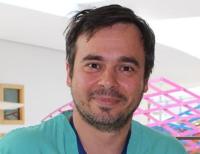In Conversation With...Nik Haliasos, consultant neurosurgeon and AI enthusiast!

We know there are lots of very interesting people in our Trust, whether through your work, your interests or your hobbies outside work. We want to get to know you and share your story.
So here is the next instalment of our new series: In Conversation With… introducing Nik Haliasos, consultant neurosurgeon who recently secured a £57,000 grant to bring Artificial Intelligence (AI) to our Trust.
Age: 42
Lives: Southgate, north London
Personal life: Lives with partner Angie Loverdou, Research Quality lead at our Trust, and their dog, Amy
What’s your role at our Trust and what does it involve?
I’m a consultant neurosurgeon, currently running our deep brain stimulation service, where we treat movement disorders by placing electrodes in certain areas of the brain. I came to our Trust in 2016 and worked under neurosurgeon Ian Low assisting him with the procedure. I’ve taken it over while he’s on a sabbatical.
I’m also head of the academic side of our Neurology department.
Tell us about the grant you’ve recently secured to bring AI to our Trust.
My role is half clinical and half research and my academic interest is AI in healthcare. I started to look at how it could benefit our Trust last year and developed an idea to use it to improve triage in our emergency departments.
We submitted a bid for funding to the Health Foundation’s innovation fund. We were shortlisted out of 200 applications and got the funding.
It’s really exciting and I’m working with consultants Darryl Wood and Sylvester Gomes and our senior charge nurse Darren Porter to progress the project.
We’re developing a tool which will assist our clinicians when they are triaging patients and act as a second pair of eyes. It will make our triage system much safer and more effective by helping to identify patients with serious conditions like stroke or sepsis and predict who will need to be admitted, which will help us to plan bed capacity.
It will also probe nurses on what questions they should ask based on the patient’s data and medical history and will learn from the information it receives.
It is not a substitute for a clinician, it will guide them - it’s augmented decision making. The clinician makes the final decision but with this technology, we’re much stronger.
We’re hoping to have our first prototype ready for testing by next March.
Why do you think it’s important to bring AI to our Trust?
Queen’s Hospital’s Emergency Department is one of the busiest in the country - we can see up to 650/700 patients a day.
Everyone needs to be assessed and the less urgent patients can wait hours to be seen.
That’s why I wanted to give nurses a tool to help them, which will also make it safer for our patients. At busy times, when the pressure is on, you can have just five minutes to triage a patient. What we don’t want to do is miss anything serious, like sepsis, which has a short window of time in which a patient needs to be given antibiotics.
I’m hoping what we create will become a standard operating procedure across the rest of the country. I think AI can revolutionise all aspects of our life. But it’s important to remember empathy and human touch is so important in patient care, and cannot be offered by a machine.
Tell us a bit more about your career and what drove you to become a doctor.
My dad was an engineer for Pirelli and he said I wouldn’t want to work with machines and oil so I should be a doctor. That started my interest in it – even though he’s actually in the office, not getting covered in oil!
I’ve always been intrigued by how the brain works – which I why I specialised in neurosurgery and am interested by deep brain stimulation, which is performed while the patient is awake.
I grew up in Greece and did my medical degree and research in Athens and was a consultant in Greece before moving to London in 2003. I did further training, including neurosurgery, here and worked at University College London Hospitals and the Royal London.
I became a consultant here in 2013.
We’ve also heard you’ve helped set up a deep brain stimulation service at home in Greece?
Yes, I did it for free while working part-time in London at the same time and I’m really glad I did.
And there was a nice bonus of meeting your partner at that time too?
Yes, I met Angie in Greece when I was setting up the DBS service and she moved over here with me. And she works at our Trust too!
When you’re not operating or developing AI to transform healthcare, what do you like to do?
In my spare time I quite enjoy windsurfing in lakes.
And our favourite question of In conversation with…..do you have any pets?
Yes, me and Angie have a dog, Amy, she’s just over a year old.
If you know someone who’s got a really interesting job, history, hobby or has achieved something worth shouting about, we want to hear from them! Drop us a line at #Communications to nominate someone, or put your hand up yourself!
